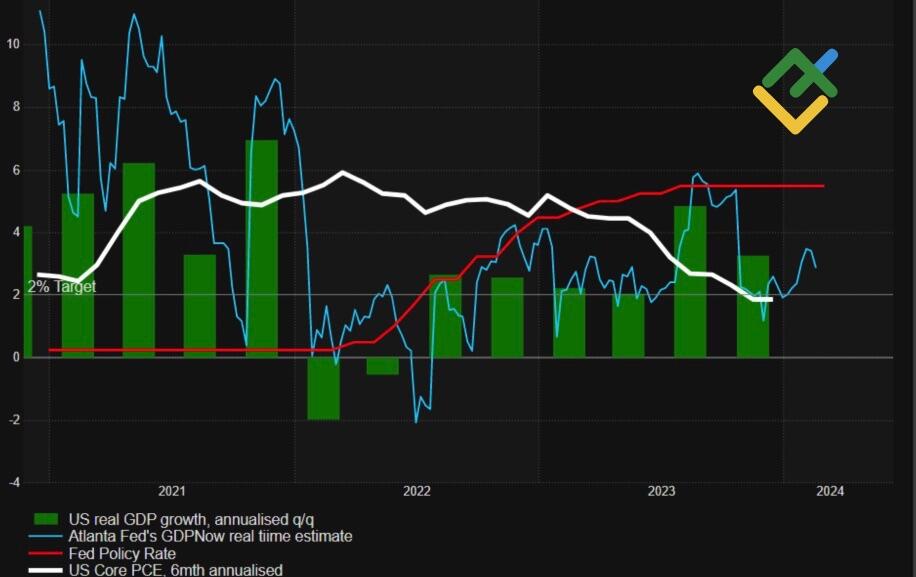"The U.S. has always driven everything, but not to this magnitude," said Jon Jonsson, senior fixed income portfolio manager at Neuberger Berman.
"The correlations have gone up quite dramatically, this is really stunning."
He added: "As an investor, it's difficult. You try to make country specific-bets, but you're not getting any benefit."
The lag in inflation and interest rates in the euro zone has left investors looking to the U.S. economy for hints about what might be coming.

The U.S. economy has powered ahead of Europe's, where governments spent less during the pandemic and industries have been hit hard by the energy crisis.
- Euro zone gross domestic product grew just 0.5% in 2023, while U.S. GDP rose 2.5%.
- Survey-based data shows the U.S. private sector is growing, while the euro zone's is contracting.
Euro zone bond markets mimic Treasuries, pushing correlations to record
But bond investors and strategists say inflation has become almost the sole focus of markets. They also note that the European Central Bank typically follows the Federal Reserve, and the U.S. bond market is a behemoth that dictates conditions around the world.
INFLATION OBSESSION
Inflation began to surge in the euro zone and the United States in 2021, prompting the Fed to hike rates in March 2022 and the ECB to follow in July.
Price growth peaked at 9.1% in the U.S. in June 2022, four months before it topped out at 10.6% in the euro zone, before falling to around 3% in both.

The lag in inflation and interest rates in the euro zone has left investors looking to the U.S. economy for hints about what might be coming.
- "A common factor has been driving inflation in the U.S. and the euro zone...the onset of COVID and the resolution of the adverse supply shock," said Stephen Jen, CEO of investment firm Eurizon SLJ Capital.
- "Bond yields, therefore, are tracking each other primarily reflecting the high correlation of inflation."
ECB Governing Council member Robert Holzmann told Bloomberg on Friday:
"Typically, the Fed in the last few years has always gone first by about half a year, so I would assume...we would also follow with delay," noting that the "currency areas are interrelated".
KING DOLLAR
U.S. bond yields have long been the benchmark for borrowing costs everywhere.
But that position has grown as U.S. administrations have issued debt at a faster pace than Europe to tackle the financial crisis and COVID-19 slump.
There is $21.9 trillion of U.S. government securities outstanding, excluding that held by the central bank, according to Barclays estimates.
That compares to $7.5 trillion for the euro zone and $1.2 trillion for Germany, its biggest economy.

As sovereign bonds are imperfect substitutes for each other and that money can flow around the world easily, when the U.S. moves, everything else tends to move in the same direction.
Yet many investors think record correlations are unlikely to last.
"We expect this correlation to fall back as we begin to see more of a divergence in macro and policy outcomes," said Julian Le Beron, chief investment officer for core fixed income at Allianz Global Investors.
Michael Metcalfe, head of macro strategy at State Street, said the correlation in bonds was likely subduing volatility in currency markets, which are driven by cash flowing towards countries with higher relative bond yields.
- A divergence in bond markets could therefore ignite volatility in FX, which has hit multi-year lows this month, he said.
Barclays economists think the ECB is in fact likely to cut interest rates in April ahead of the Fed in June, given the weaker euro zone economy.
"Say the ECB makes significant revisions to their forecasts, and takes a dovish turn, then it again bodes well for (German) Bunds to outperform Treasuries," said Barclays' head of euro rates strategy Rohan Khanna.
Reporting by Harry Robertson; Editing by Amanda Cooper and Kirsten Donovan
/cloudfront-us-east-2.images.arcpublishing.com/reuters/CWRFIT6TSRLHFEUM77MGA526VM.jpg)










No comments:
Post a Comment